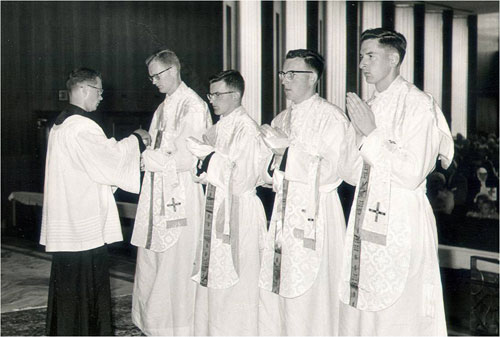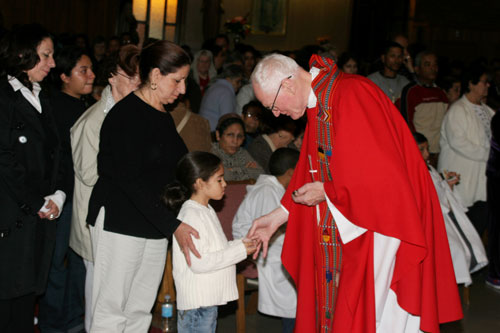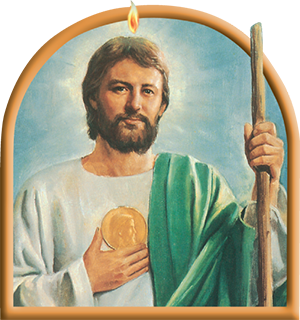Fr. Brummel celebrates milestones with St. Jude
 In 2013, Father Mark Brummel, C.M.F., celebrated his 50th anniversary of ordination to the priesthood. And it doesn’t seem that he is looking for any reason to slow down even now. For the past 40 of his 50 years as a priest, Fr. Brummel has served as director of the National Shrine of St. Jude, witnessing the profound faith of so many who send their petitions to as well as visit the Shrine. Father Brummel’s initial connection to St. Jude came early in life, as he happened to be born on the Feast of St. Jude—October 28th, 1933 on the South Side of Chicago. His brother Tom entered the Claretians’ St. Jude seminary in Chicago in 1945, and Father Brummel followed him there a couple of years later.
In 2013, Father Mark Brummel, C.M.F., celebrated his 50th anniversary of ordination to the priesthood. And it doesn’t seem that he is looking for any reason to slow down even now. For the past 40 of his 50 years as a priest, Fr. Brummel has served as director of the National Shrine of St. Jude, witnessing the profound faith of so many who send their petitions to as well as visit the Shrine. Father Brummel’s initial connection to St. Jude came early in life, as he happened to be born on the Feast of St. Jude—October 28th, 1933 on the South Side of Chicago. His brother Tom entered the Claretians’ St. Jude seminary in Chicago in 1945, and Father Brummel followed him there a couple of years later.
Father Brummel became interested in a religious vocation at an early age. “In grammar school at Christ the King,” he says, “I was inspired by the priests and nuns of the parish, and also received encouragement from my parents.” Father Brummel made his first vows as a Claretian in 1952, took his perpetual vows in 1955 and was ordained a Claretian priest at his home church, Christ the King, on June 11, 1960.
 His first assignment after ordination was teaching Latin and Greek at St. Jude Seminary where he had begun his studies. For ten years, he taught and served as librarian.
His first assignment after ordination was teaching Latin and Greek at St. Jude Seminary where he had begun his studies. For ten years, he taught and served as librarian.
In 1970, Father Brummel moved into the ministry of Director of the National Shrine of St. Jude in Chicago. In addition to his work with the Shrine and its St. Jude League, he has dedicated countless hours to community involvement. He has served as a director on numerous boards of organizations helping those in need.
Fr. Brummel is quick to focus any discussion about his life and the ministries he is involved in on the people he serves, especially devotees of St. Jude. He has read and been inspired by countless petitions and letters of thanks to St. Jude that come from across the country every day. He is still struck by the ongoing devotion of the faithful.
“I know people today who have been regulars at the novena services for over 50 years,” says Father Brummel. “The Shrine attracts a variety of people, young and old, from different backgrounds and cultures. This devotion to St. Jude truly has a universal appeal.”
 Devotion to St. Jude has been a constant in the South Chicago neighborhood, and spread from there to a national popular devotion since the founding of the National Shrine of St. Jude in 1929 by the Claretians.
Devotion to St. Jude has been a constant in the South Chicago neighborhood, and spread from there to a national popular devotion since the founding of the National Shrine of St. Jude in 1929 by the Claretians.
Every year hundreds of thousands send their petitions by mail, through the Shrine’s website, or deliver them in person during the five Solemn Novenas to St. Jude held at the Shrine.
 “I am amazed how many people use the word ‘miracle’ when they are expressing their gratitude to St. Jude,” says Father Brummel. He admits that years ago he was somewhat uncomfortable with the use of that term. “But I’ve come to understand that the word ‘miracle’ has many different meanings for people. It’s not necessarily the kind where the Blessed Mother appears to someone or leaves her image on a tree.
“I am amazed how many people use the word ‘miracle’ when they are expressing their gratitude to St. Jude,” says Father Brummel. He admits that years ago he was somewhat uncomfortable with the use of that term. “But I’ve come to understand that the word ‘miracle’ has many different meanings for people. It’s not necessarily the kind where the Blessed Mother appears to someone or leaves her image on a tree.
“I always say we don’t have any crutches that are left at the Shrine,” says Father Brummel. “We don’t expect miracles in the grand sense, but we hear about many small miracles, things that you can’t explain.”
 Recently, Father Brummel received a call from a St. Jude devotee whose newborn grandchild had been diagnosed with aortic stenosis, a condition that urgently required a heart transplant. The baby had been placed on a waiting list for the transplant, but his chances were remote.
Recently, Father Brummel received a call from a St. Jude devotee whose newborn grandchild had been diagnosed with aortic stenosis, a condition that urgently required a heart transplant. The baby had been placed on a waiting list for the transplant, but his chances were remote.
At the request of the grandfather, Father Brummel brought the Shrine’s glass-encased relic of St. Jude to the hospital. “The child was in a small oxygen tent, so I was just going to give the family a blessing. But they insisted I touch the baby with the relic; they wanted to make sure that that was done. They weren’t superstitious in any way, but they were praying for God’s help in this manner.”
The parents knew a lot about the medical condition and its dire prognosis. “Yet they were very hopeful,” Father Brummel remembers. About a month after his visit to the hospital, their prayers were answered when a heart arrived, and the subsequent transplant was successful.
 “I’m sure there were a lot of other people praying for them, but it was significant that the family should call on St. Jude,” says Fr. Brummel. “Some called it a miracle, but clearly there was also a lot of great medical intervention as well. People have faith that God is present to them in a special way. Whether you choose to call it a miracle or not, it is the grace of God working in people.”
“I’m sure there were a lot of other people praying for them, but it was significant that the family should call on St. Jude,” says Fr. Brummel. “Some called it a miracle, but clearly there was also a lot of great medical intervention as well. People have faith that God is present to them in a special way. Whether you choose to call it a miracle or not, it is the grace of God working in people.”
What Fr. Brummel remembers most throughout his many years at the National Shrine of St. Jude are not extraordinary cures or miraculous interventions but the quiet confident trust of all those devoted to St. Jude. “One person may face a serious health problem, another may have to cope with a difficult family member or struggle with the loss of a loved one, but they come to the Shrine or send their petitions with confidence in their prayer that St. Jude will intercede with God in their time of need—and I am inspired by that.”
